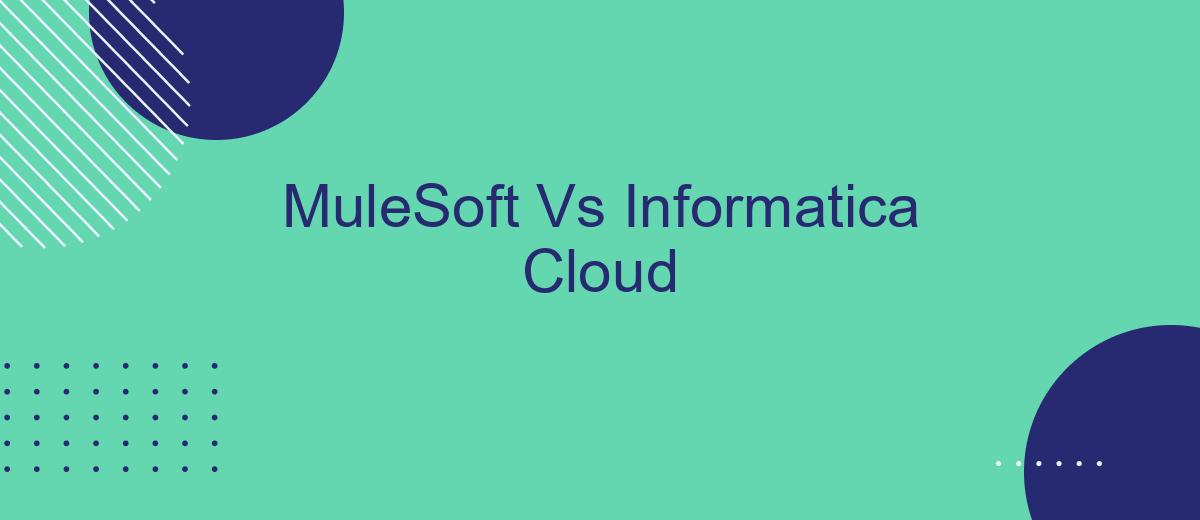In today's fast-paced digital landscape, integrating diverse systems and applications is crucial for business agility and efficiency. MuleSoft and Informatica Cloud are two leading integration platforms that offer robust solutions for connecting data, applications, and devices. This article delves into a comparative analysis of MuleSoft and Informatica Cloud, highlighting their features, strengths, and key differences to help you choose the right integration tool for your needs.
Introduction
In today's digital landscape, businesses require robust and efficient integration platforms to streamline their operations and enhance data connectivity. Two popular solutions in this space are MuleSoft and Informatica Cloud. Both platforms offer a range of features designed to simplify the integration process, but they cater to different needs and use cases.
- MuleSoft: Known for its comprehensive API management and flexibility, MuleSoft is suitable for complex enterprise-level integrations.
- Informatica Cloud: Renowned for its user-friendly interface and strong data management capabilities, Informatica Cloud is ideal for businesses looking for ease of use and quick deployment.
Understanding the distinct advantages of MuleSoft and Informatica Cloud can help organizations choose the right tool for their specific requirements. Additionally, services like SaveMyLeads can further simplify the integration process by automating data transfers between various platforms, ensuring seamless connectivity and operational efficiency.
Feature Comparison

MuleSoft and Informatica Cloud are both powerful tools for integration, but they offer distinct features that cater to different needs. MuleSoft provides a robust API-led connectivity approach, enabling users to build and manage APIs with ease. It supports a wide range of connectors and offers advanced data transformation capabilities. MuleSoft's Anypoint Platform is highly scalable, making it suitable for large enterprises with complex integration requirements.
Informatica Cloud, on the other hand, excels in data integration and data management. It offers pre-built connectors for various applications and databases, simplifying the integration process. Informatica's Intelligent Cloud Services (IICS) provide advanced data quality and governance features, ensuring data consistency and compliance. For businesses looking for a simplified way to automate their integrations, services like SaveMyLeads can be beneficial. SaveMyLeads offers easy-to-use tools to connect various applications without deep technical knowledge, making it a great complement to more complex platforms like MuleSoft and Informatica Cloud.
Pricing and TCO

When comparing MuleSoft and Informatica Cloud in terms of pricing and total cost of ownership (TCO), it's essential to consider various factors such as subscription fees, implementation costs, and ongoing maintenance. Both platforms offer flexible pricing models, but the overall cost can vary significantly based on the specific needs of your organization.
- Subscription Fees: MuleSoft and Informatica Cloud have different pricing tiers based on the number of integrations, data volume, and additional features. MuleSoft typically charges based on the number of API calls, while Informatica Cloud often uses a user-based pricing model.
- Implementation Costs: Both solutions require initial setup and customization. MuleSoft's Anypoint Platform may require more extensive configuration, whereas Informatica Cloud offers more out-of-the-box solutions. Services like SaveMyLeads can simplify the integration process, potentially reducing initial costs.
- Maintenance and Support: Ongoing costs include regular updates, support, and scaling. MuleSoft offers comprehensive support packages, but they can be costly. Informatica Cloud provides various support levels, which can be more budget-friendly for smaller organizations.
In conclusion, while both MuleSoft and Informatica Cloud have their unique strengths, the total cost of ownership will depend on your specific use case, the complexity of integrations, and the level of support required. Tools like SaveMyLeads can further optimize costs by streamlining the integration process.
Use Cases and Industries

MuleSoft and Informatica Cloud are both pivotal players in the integration platform as a service (iPaaS) space, catering to diverse business needs. MuleSoft is renowned for its ability to connect any application, data, and device with APIs, making it a versatile choice for enterprises looking to streamline their operations. Informatica Cloud, on the other hand, excels in data integration and management, offering robust tools for data migration, synchronization, and quality control.
Both platforms find applications across various industries due to their flexible and scalable solutions. MuleSoft is widely used in sectors like healthcare, finance, and retail, where seamless integration of disparate systems is crucial. Informatica Cloud is popular in industries such as telecommunications, manufacturing, and government, where data accuracy and consistency are paramount.
- Healthcare: Integrating patient records across multiple systems.
- Finance: Streamlining financial data for better decision-making.
- Retail: Enhancing customer experience through integrated CRM systems.
- Telecommunications: Managing vast amounts of customer data efficiently.
- Manufacturing: Synchronizing supply chain data for optimized operations.
Platforms like SaveMyLeads can further enhance these integrations by automating the connection between various applications, ensuring that data flows seamlessly and reducing manual effort. Whether it's MuleSoft or Informatica Cloud, leveraging such services can significantly boost operational efficiency and data reliability.
Conclusion
In conclusion, both MuleSoft and Informatica Cloud offer robust solutions for integration needs, each with its own set of strengths. MuleSoft excels in providing a comprehensive API-led approach, making it ideal for organizations looking to build a connected ecosystem with a focus on API management. On the other hand, Informatica Cloud stands out for its user-friendly interface and strong data integration capabilities, making it a preferred choice for businesses that prioritize ease of use and data-centric operations.
When deciding between the two, it is crucial to consider your specific business requirements, technical expertise, and long-term integration goals. For those looking for an alternative that simplifies the process of setting up integrations without extensive technical knowledge, services like SaveMyLeads can also be a viable option. Ultimately, the right choice will depend on your organization's unique needs and the level of complexity you are prepared to manage in your integration projects.


FAQ
What are the main differences between MuleSoft and Informatica Cloud?
Which platform is better for small to medium-sized businesses?
Can both platforms handle real-time data integration?
How do MuleSoft and Informatica Cloud handle security?
What options are available for automating and configuring integrations with these platforms?
Use the SaveMyLeads service to improve the speed and quality of your Facebook lead processing. You do not need to regularly check the advertising account and download the CSV file. Get leads quickly and in a convenient format. Using the SML online connector, you can set up automatic transfer of leads from Facebook to various services: CRM systems, instant messengers, task managers, email services, etc. Automate the data transfer process, save time and improve customer service.
